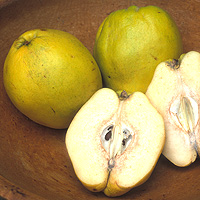Quince

Preparation, Uses, & Tips
Almost anything that can be done with apples can be done with quinces. They need a similar length of cooking time and are delicious stewed, baked, and made into fruit butter. When baking with quinces, add sugar only after they become soft and the flesh starts to change in color from white to pink.
Quince around the world
Quince paste is still widely made in France (contignac) and Spain (membrilo), while a quince spread (dulce do membrilo) is made in Argentina and Chile.
Morroccan cuisine incorporates quinces in its flavorful tagines, stew-like combinations of meats and dried fruits often spiced with cinnamon and cloves.
Cutting, peeling, and coring quince
Peel quince before using it in jams, preserves, desserts, and savory dishes. Since quince is such a hard fruit, be sure to use a large, firm chef’s knife to cut it into halves, quarters, or slices. Peeling works well with a vegetable peeler or a small paring knife. Remove the core with a small, firm paring knife.
Quince “sauce”
Quince makes an excellent fruit sauce similar to applesauce. To prepare, peel a few quinces, slice them, and remove the seeds. Cook them in a small amount of water with plenty of sweetener of choice until they reach a pulpy consistency like applesauce. Mash or puree in a food processor and serve.
Copyright © 2026 TraceGains, Inc. All rights reserved.
Learn more about TraceGains, the company.
The information presented in the Food Guide is for informational purposes only and was created by a team of US–registered dietitians and food experts. Consult your doctor, practitioner, and/or pharmacist for any health problem and before using any supplements, making dietary changes, or before making any changes in prescribed medications. Information expires December 2026.
